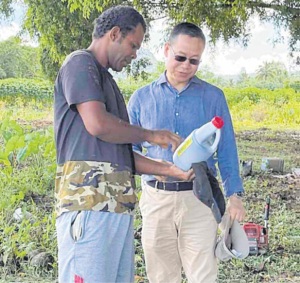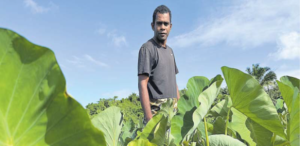IN a world constantly evolving with new challenges, agriculture is no longer just about planting crops or raising livestock.
It has become a powerful business sector that not only feeds communities but also drives economic growth and sustains livelihoods.
This is a reality that Asaeli Uluimoala, a chef-turned farmer, knows all too well.
Originally from Yaroi Village in Moala, Lau, Mr Uluimoala was working in the tourism and hospitality industry for over a decade before the COVID-19 pandemic changed his life forever.
Since 2009, he had built a career working as a professional chef at some of Fiji’s most prestigious resorts, including the high-end Laucala Island Resort in Taveuni.
He later worked at Air Terminal Services in Nadi before the global pandemic crippled Fiji’s tourism industry.
“When COVID-19 hit, everything came to a standstill,” Mr Uluimoala said.
“With no tourists coming into the country, it was a challenging time for everyone in the tourism sector.”
Forced to rethink their future, Mr Uluimoala and his wife moved to Sadro Village in Deuba, where he decided to turn to the land for survival and eventually, for success.
Having spent years in the hospitality industry, Mr Uluimoala applied the same discipline and business acumen he learnt in hotels to farming.
“I treated my farm just like a business. It’s not just about planting crops, it’s about understanding what the market needs, maintaining quality and managing resources well,” he said. Since starting his farming journey in 2020, Mr Uluimoala has never looked back.
Not only has his farm put food on the table for his family, it has also become a significant source of income, sometimes tripling or quadrupling what he used to earn as a chef. “For me, the land has proven to be a reliable source of income,” he said.
“The beauty of farming is that you are your own boss. You decide when to plant, when to harvest, and when to sell,” he said.
One of Mr Uluimoala’s biggest goals now is to attract young people to agriculture.
He believes that changing the mindset about farming is critical.
“In many jobs, your income is determined by your hours of work. But in farming, your hard work directly translates into your income. It’s about taking ownership,” he said.
He has even coined his own slogan to encourage youth engagement in agriculture: “How to lure the young generation and youth to agriculture.”
Mr Uluimoala now works closely with the Ministry of Agriculture, the Food and Agriculture Organization (FAO), United Nations Development Programme and other partners to promote sustainable farming practices and elevate agriculture to a recognised business level.
Through training programmes like Farm to Fork, supported by the Food and Agricultural Organisation, Mr Uluimoala has learned how to align his farming operations with business standards that meet the needs of hotels and larger markets.
He now supplies his produce to hotels in Pacific Harbour and markets in Navua, proving that farming can be both sustainable and profitable.
Recognising the challenges of farming alone, Mr Uluimoala joined forces with 12 other farmers to form the ANCF Serua Cooperative.
This collective approach has allowed them to pool resources, access government support and invest in farming machinery that individual farmers might not afford on their own.
“The cooperative concept makes farming easier. We can share resources, knowledge, and help each other grow,” he said.
Their cooperative has already benefited from government support, including subsidised farming equipment to further strengthen their operations.
Mr Uluimoala’s story is a testament to resilience, innovation and the potential of agriculture as a viable business for Fiji’s future, especially for landowners.
“When you work the land, you control two key things: food security and financial independence,” he said.
His message to others is clear: “The land is a blessing. Whether you work in an office or any other profession, the land will always be there ready to sustain you and your family.”


Note: This article was first published on the print version of the Fiji Times dated April 12, 2025



